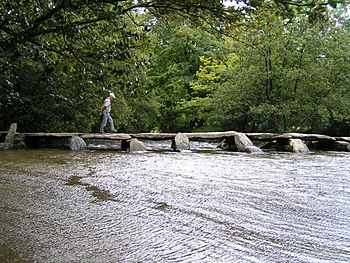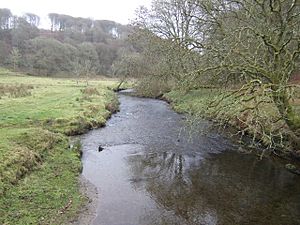River Barle facts for kids
Quick facts for kids River Barle |
|
|---|---|

Tarr Steps viewed downstream
|
|
| Country | England |
| Counties | Devon, Somerset |
| Cities | Withypool, Simonsbath |
| Physical characteristics | |
| Main source | Near Simonsbath, Exmoor, Somerset 400 m (1,300 ft) 51°08′30″N 3°48′38″W / 51.14167°N 3.81056°W |
| River mouth | River Exe Exebridge, Devon 51°00′37″N 3°31′55″W / 51.01028°N 3.53194°W |
| Length | 39.6 km (24.6 mi) |
| Basin features | |
| Tributaries |
|
The River Barle is a beautiful river in England. It starts high up on Exmoor in Somerset. The river then flows south to join the River Exe in Devon.
Both the River Barle and the Barle Valley are very special places. They are protected areas called biological Sites of Special Scientific Interest. This means they are important for nature and wildlife.
High up on the Chains, near Simonsbath, you can find Pinkery Pond. This pond is about 3 acres big. It was made in the 1800s by a man named John Knight and his son. They built a dam across the river to create it. No one is quite sure why they built it, but you can still see parts of a small canal nearby.
Contents
Historic Crossings of the River Barle
The River Barle flows under several interesting bridges. These bridges have been used by people for a very long time.
Landacre Bridge: A Medieval Crossing
Near Withypool, the river passes under Landacre Bridge. This bridge is very old, built in the late Middle Ages. It is made of stone and has six arches. It's a lovely example of old bridge building.
Tarr Steps: An Ancient Mystery
One of the most famous crossings is the Tarr Steps. This is a very old bridge, possibly built around 1000 BC! It's a type of bridge called a clapper bridge. This means it's made of huge flat stone slabs. Some of these stones weigh up to 5 tons each.
The bridge is about 180 feet long and has 17 sections. Local stories say the devil himself placed the stones there. The Tarr Steps are so important that they are a Grade I listed building. This means they are a very special historic site.
Barle Bridge: Crossing in Dulverton
In the town of Dulverton, the River Barle is crossed by the Barle Bridge. This bridge helps people travel over the river in the town.
Wildlife and Nature Along the Barle
The River Barle flows through some amazing natural areas. These places are home to many different plants and animals.
Protected Nature Reserves
The river runs through the Somerset Wildlife Trust's Mounsey Wood Nature Reserve. It also passes through the Knaplock and North Barton Site of Special Scientific Interest (SSSI). These areas are part of Exmoor National Park. They have been protected since 1954.
Special Plants and Animals
You might spot a bright blue kingfisher darting along the river. Knaplock and North Barton is also one of the only places on Exmoor where you can find a plant called great burnet. The river itself is a home for the Eurasian otter. These playful animals love to swim and hunt in the clear waters.
Fun Activities on the River Barle
The River Barle is a great place for outdoor activities. Many people enjoy spending time here.
Fishing for Salmon and Trout
If you like fishing, the Barle is a good spot. People often catch Salmon and trout in its waters.
Walking Along the River
A long walking path called the Two Moors Way follows the river for much of its journey. This is a perfect way to explore the beautiful Barle Valley on foot.
Kayaking and Canoeing Adventures
The upper parts of the River Barle are popular for whitewater kayakers. The river has exciting rapids that are fun to paddle. These rapids are usually rated as Grade 2 (or 3-), which is good for beginner to intermediate kayakers and canoeists.
 | Chris Smalls |
 | Fred Hampton |
 | Ralph Abernathy |


